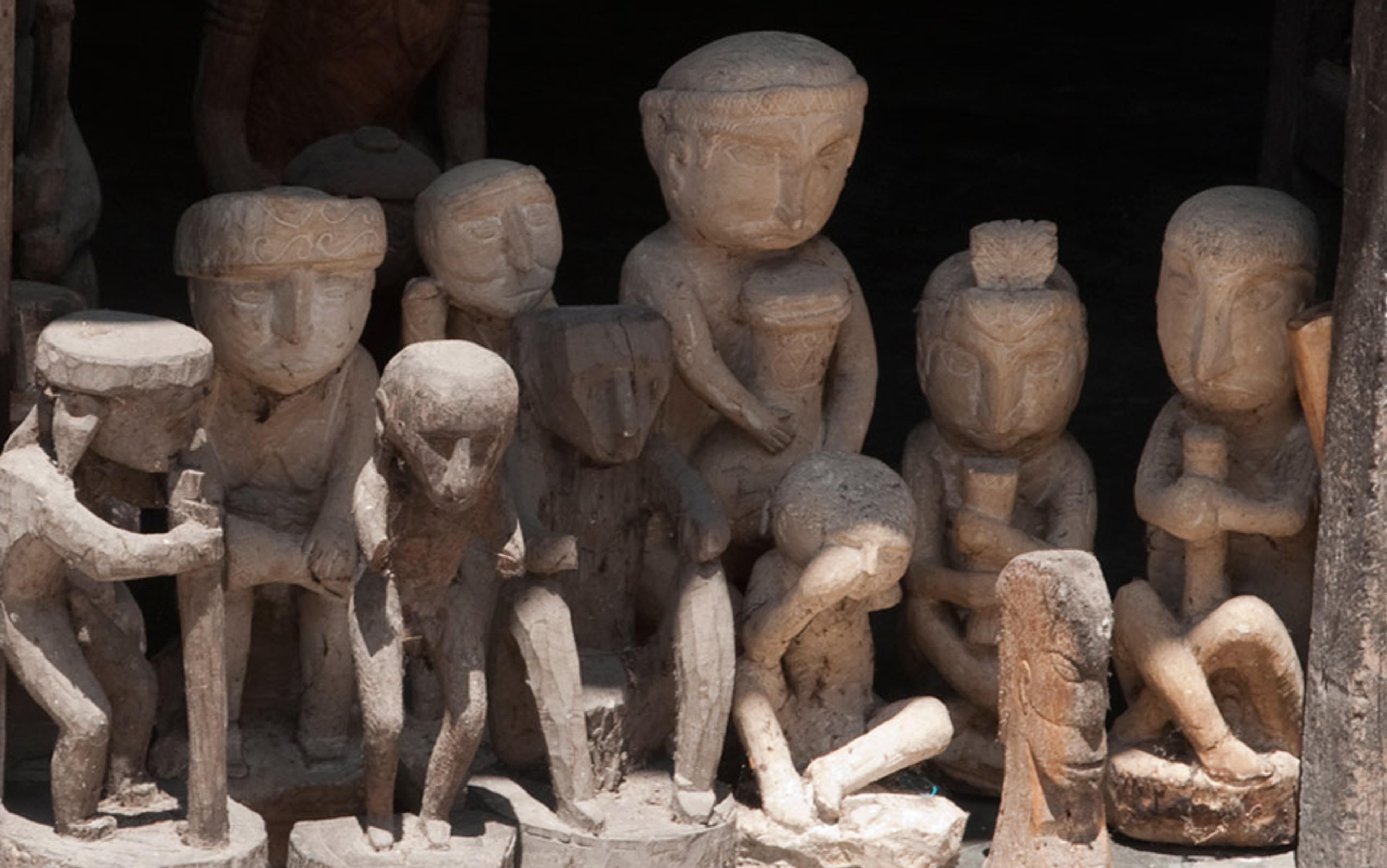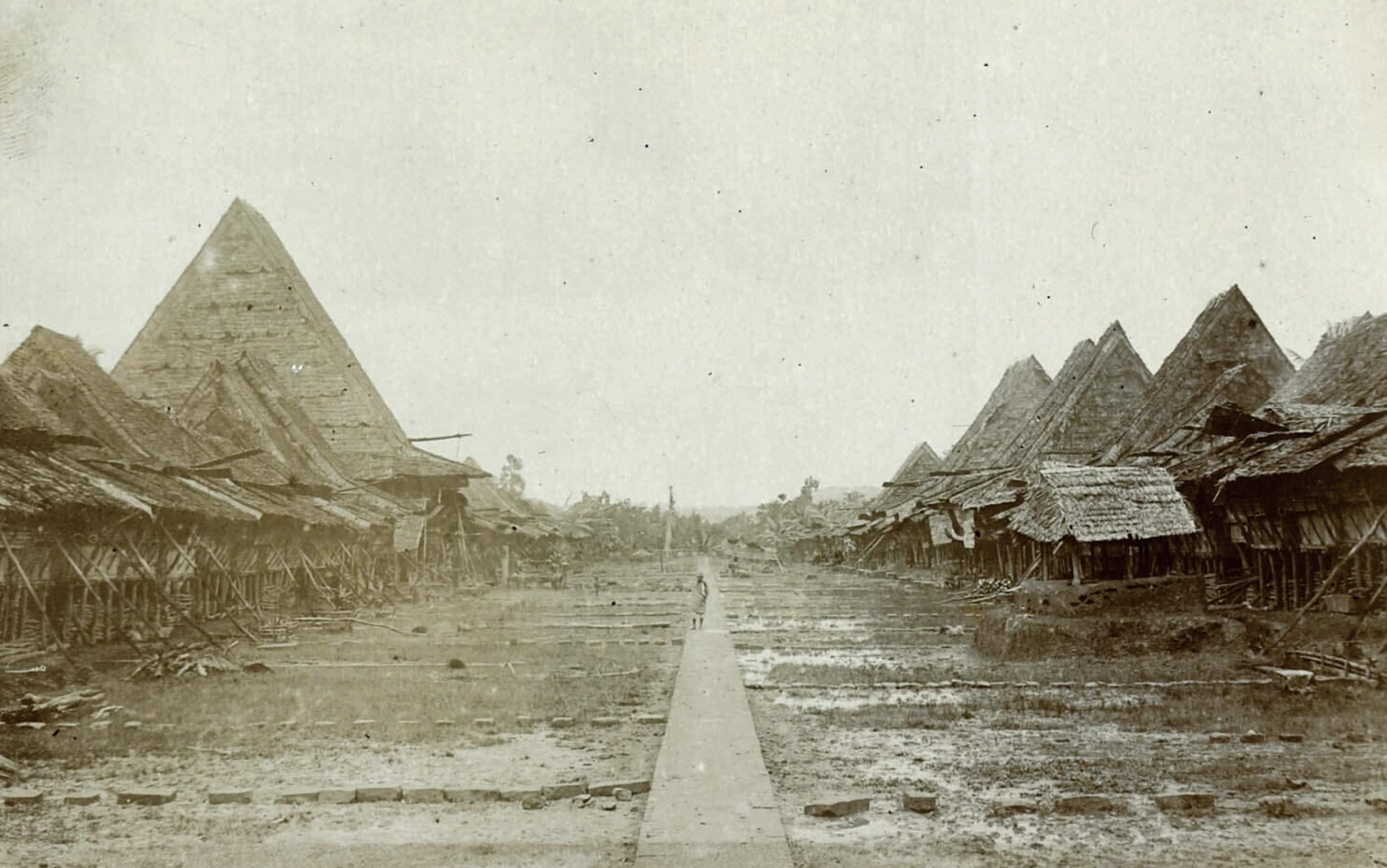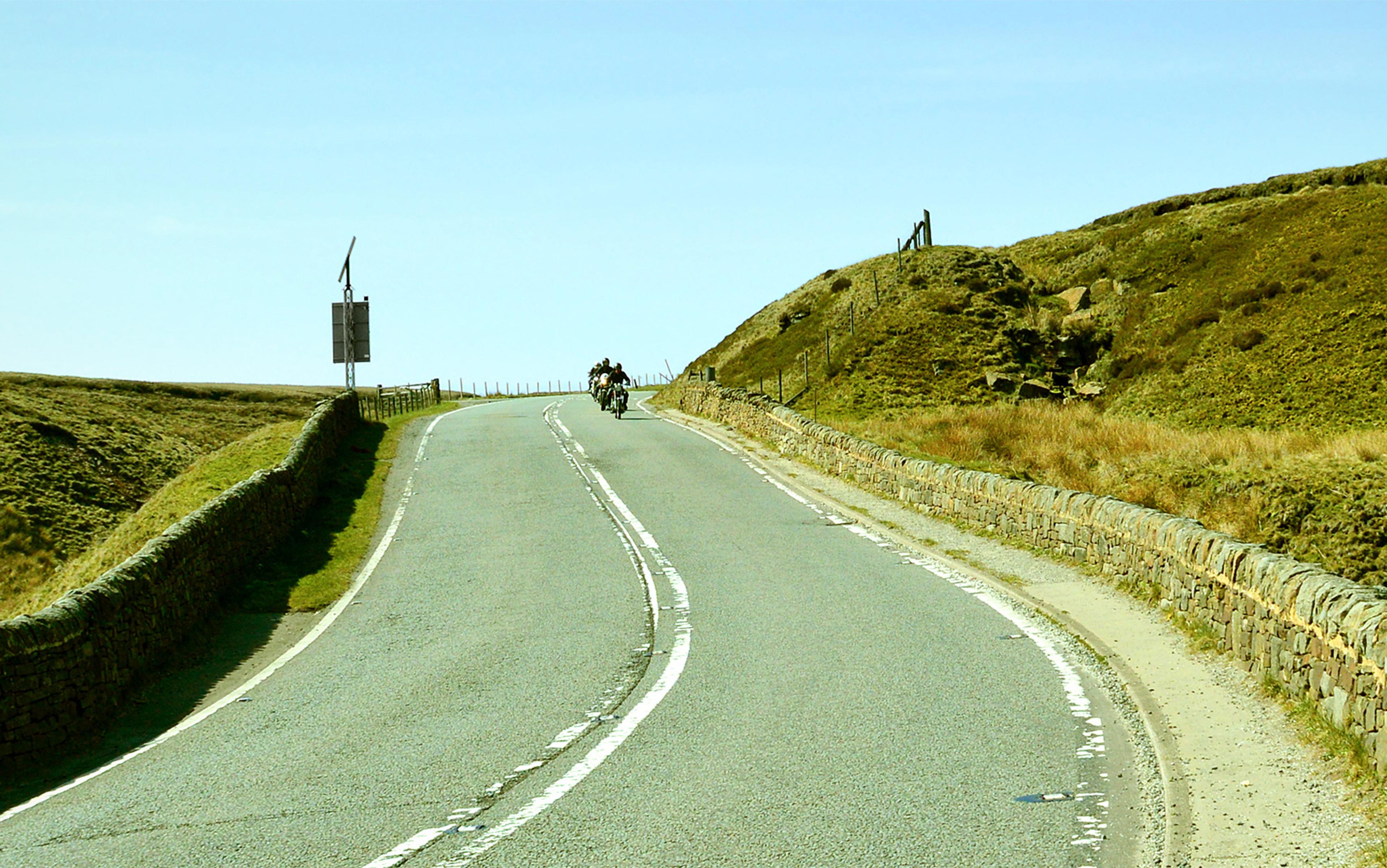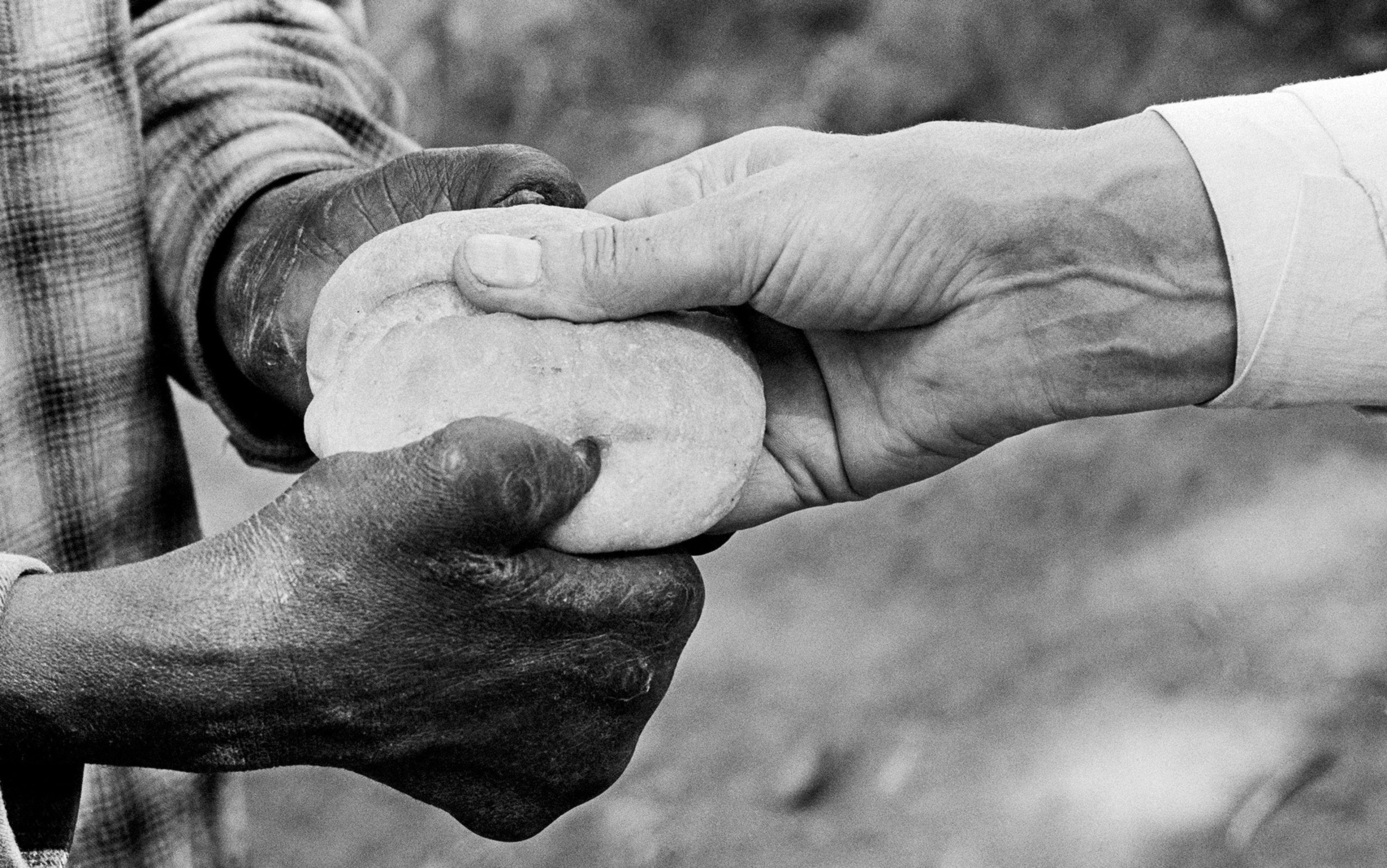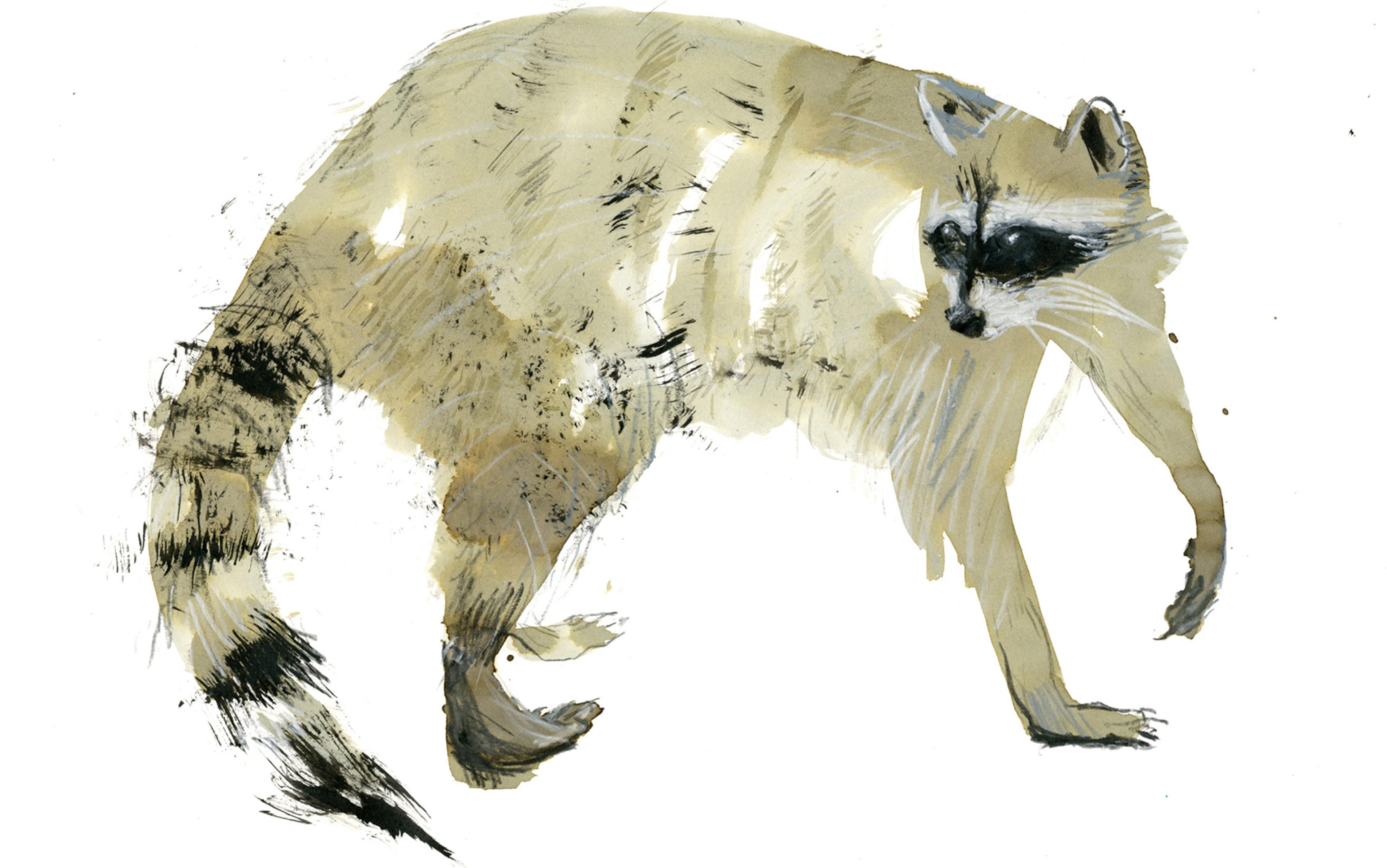Atuf, the culture hero, turned to stone. So, too, did Inkelu, his sister. That is how things happened in the Tanimbar Islands. And after several months of travelling around this group of 65 islands in Indonesia, I was used to the stories. But with the sculptor Isaac, things were different. Things were different because he didn’t turn to stone: instead, he turned to wood. Things were different because with Isaac, it was not a matter of ancient stories and legends. And things were different because with Isaac, it was my own fault.
It was midafternoon in the village of Alusi Krawain, and Isaac was seated on the dirt floor of his house, lit by the scant light that came through the open door. Up in the rafters, lizards called to each other: tok-eh, tok-eh. Isaac was wearing only a pair of old, stained shorts. His body was thin, his arms wiry and muscled. A pair of spectacles sat low on his nose, set at a slight angle, the right arm broken. I guessed he was around 60, but it was hard to tell. He could have been 10 years younger or 10 years older. ‘I have decided to make you a sculpture,’ he said, ‘even though I am old and my body is sick. I will make you a gift, and you will take it back to the West, so everybody will know of my greatness.’
I had been four months in Tanimbar, a remote archipelago in a corner of South-East Indonesia, a fledgling anthropologist studying the work of sculptors. And of all the sculptors in the islands, Isaac was the finest. I had first seen his works in Saumlaki, the chief town on Yamdena, the largest of the Tanimbar Islands. I was so impressed by their grace and beauty that I had travelled up to Alusi Krawain to meet their creator in his house. When I had first turned up unannounced, Isaac had treated me with wariness; but over the following few days he had become more openly hospitable, happily chatting about his peculiar abilities. Untaught, his skill wholly unlearned, he told me he owed his talents to the tetek nenek moyang, the ancestors. It started, he said, when he was at school. His father took him to the forest, spoke prayers to the ancestors, and gave him a bitter leaf to eat. Isaac returned home with bitterness in his mouth, and that very same evening, without teacher or mentor or exemplar, he started to carve.
‘My first sculpture,’ he said, coughing through the clouds of clove cigarette smoke, ‘was a bust of Sukarno. He was president back then. I made the most beautiful bust anybody had ever seen. It is now in a government building in the Kai Islands. But I cannot be arrogant. The power is not my own: it is my kekuatan mata rumah, the power of my household. My gift is a burden: if I go without carving for a month, sometimes even a week, my body itches. I am uncomfortable. I cannot sit still. Smoking and palm-wine do not help. The itchiness becomes unbearable, and I have to start working. Then, the moment I begin to carve, the itch disappears.’
We sat silently for a while. Then Isaac smiled at me. ‘I will make you a walut, an ancestor figure. You can take it back to the West and tell people about my gift.’
‘Thank you,’ I said; and Isaac, who didn’t want thanks, because after all it was not his power, did not reply.
That evening, I headed back in the fading afternoon light, taking the path up the hill. The sun was setting over the forest to the west, and a cool breeze blew in from the sea. It was possible to hear the distant suck of the waves against the coral. The sun was disappearing as I arrived at the home of my hosts in the village. Bapak Lerebulan, a quiet and courteous man, taught in the village school. Ibu Lerebulan, his considerably larger and more forceful wife, was the self-appointed moral guardian of the village, and spent her days on the porch monitoring the shortcomings of her neighbours. Their one child, a daughter, was away at school in Saumlaki, some 20 miles to the south. Their son, the younger and more favoured of the two children, had died when he was barely into his teens. The night that I arrived in the village, Ibu told me that God had taken away her son but now He had given her another one. The sentiment made me both grateful and uneasy.
To break with adat was to risk angering the ancestors, occasioning madness, sickness or death
Since arriving in the village, I had been spending my evenings with the Lerebulans: eating, drinking palm-wine, listening to Tom Waits on my tinny cassette recorder, and occasionally dancing with Ibu for the entertainment of the other villagers, who would crowd into the house to watch us.
That evening, over dinner, I told them about Isaac’s offer of a gift. Ibu smiled a toothy smile. ‘It is good that Isaac has made you this offer,’ she said, ‘but you must be careful.’
‘Careful? Of what?’
‘You must be careful of adat,’ she said.
Adat is a word that is almost impossible to translate with precision. Sometimes it is translated as ‘ritual law’, the law sanctioned by the ancestors; but adat is more than just a matter of tradition. For the Tanimbarese, adat ritual law had all the force of the laws of nature. To break with adat was to risk angering the ancestors, occasioning madness, sickness or death. All this I knew already, but I had no idea why Isaac’s offer should involve the complexities of adat, so I just mumbled: ‘Yes, I’ll be careful,’ and continued to eat.
The following day, I went down to Isaac’s house. His door was open and I saw him sitting on the floor, working with a chisel at a piece of wood that he held between his bare feet. On a bench in the darkness were three or four onlookers. Isaac gestured that I should come in.
I sat and watched him work. The sculptor had four tools in all — a chisel, a mallet, a penknife and a file. The file was home-made, fashioned of rough fish-skin stretched over a stick, as robust as any file made of metal. Isaac indicated I should sit down. ‘When you came to me,’ he said, ‘I did not want to make a sculpture. But after I met you, my body became itchy, so I knew the ancestors wanted me to start work.’ He knocked off a corner of the wood with the chisel and mallet, then he started to cough. One of the spectators passed him a cigarette. ‘It calms the chest,’ he said, taking a long draw. He passed me the lit cigarette. I shook my head.
I spent the morning in the darkness watching the sculptor chipping away at the wood. Every so often, he stopped work, a rattling cough shook his body, and then he reached out for a cigarette, deeply breathed in the smoke, and returned to work.
When I stood to leave, Isaac said: ‘When the sculpture is finished, we must have a mandi adat.’
‘Mandi adat?’ I asked. The literal meaning of the term was ‘ritual law bathing’, but I had no idea what that meant.
Isaac pushed his glasses up his nose. ‘The sculpture,’ he said, ‘is made by the power of the ancestors. It is hot with the heat of the tetek nenek moyang [the ancestors]. Without a mandi adat you will be in danger. The mandi adat will make the sculpture cool, so that you can take it home without danger.’
I paused. ‘What danger?’ I asked.
‘A plane crash,’ said Isaac. ‘Or maybe sickness. Or madness. Or death …’ Then he dismissed me with a curt wave of the hand.
Over the next few days, I went down every afternoon to see Isaac and to watch the walut taking shape. From out of the wood emerged a figure sitting cross-legged on a small plinth, a loincloth around his waist, a turban on his head. The sculpted figure was looking upwards, hands lifted in front of his body, offering up a plate. Around the figure’s neck was a carved pendant, representing the heirloom gold of a nobleman.
‘The figure is telling the future by studying the guts of a chicken,’ Isaac said. ‘He is making offerings to the ancestors.’
‘It is a beautiful carving,’ I said.
Isaac started to cough, took a cigarette to clear his lungs, then he put down his tools. ‘Do not praise me, or I will become arrogant and the ancestors will punish me.’
This vast, turning network of exchange pathways was becoming ragged and patchy, the flow of heirloom gold increasingly erratic
He propped up the sculpture and looked at it, squinting a little. ‘Go and speak to Ibu Lerebulan about the mandi adat,’ he said. ‘Leave me to work. I will be finished maybe in three days, maybe four. I will call for you again when the sculpture is done.’
I left Isaac’s house and, because it was not yet evening, walked down towards the sea, taking the steps that led down the cliff-face to the bay. I sat on the beach and watched the surf breaking over the reefs. Frigate birds turned circles over my head. I watched the fishermen in their dugouts, far out towards the horizon, until the shadow of the cliffs made me shiver.
That night, Ibu and Bapak Lerebulan briefed me on what I needed to know about the mandi adat. After the sculpture was finished, we would go to Isaac’s house. I would bring a bottle of palm-wine and a small sum of money as a ‘cork’. Bapak would bring heirloom gold to exchange.
It was only when Bapak offered to contribute gold that I realised Isaac’s gift was a more complex and weighty thing than I could have imagined. I had read the anthropology textbooks on gift exchange. I knew all about the Trobriand islanders in Papua New Guinea and their kula ring, described back in 1922 by the great Polish anthropologist, Bronisław Malinowski, a big cycle of ceremonial gift exchange that united often remote communities. I knew about the famous distinction, made in 1925 by the French anthropologist Marcel Mauss, between the exchange of gifts and the exchange of commodities. When I go into a shop to buy a croissant, I go my own way without a further thought given to the baker or the shopkeeper; but when I exchange gifts, I am drawn into a more abiding set of relationships and mutual obligations, because a gift, for Mauss, is never free.
I also knew from Susan McKinnon, professor of anthropology at the University of Virginia, that the Tanimbar Islands themselves were crisscrossed by innumerable gift exchange relationships, a kula ring of sorts, made up of invisible pathways by means of which gifts, hot with the power of the ancestors, were exchanged: a great cycle of exchanged goods, running clockwise and counter-clockwise throughout the islands, cementing friendships, alliances and social relationships as, down the generations, heirloom gold, walut sculptures and other goods passed from household to household. And I knew that this vast, turning network of exchange pathways was becoming ragged and patchy, the flow of heirloom gold increasingly erratic, as families, pressed by hunger, poverty, or greed, sold off the goods of which they were more custodians than owners, breaking the old pathways, severing the cycle of relations. I knew all this, but I had not expected to find myself caught up, implicated, in this web of forces — an honorary son to the Lerebulan household, up to my neck in a system of exchange the mechanics of which I could barely comprehend.
The mandi adat would begin, Bapak Lerebulan said, with my offering the palm-wine to Isaac. Then prayers would be made to the ancestors and the palm-wine sprinkled. Already, Bapak was looking twitchy and anxious about the prospect, as if he already knew that things were destined to go badly. ‘When the mandi adat takes place,’ he said, his forehead furrowing, ‘you must say nothing at all. I will take care of everything. It is important that you do not speak.’
I nodded.
‘We will ask the ancestors to approve the exchange,’ he said. ‘They will answer us using the voices of the tokeh [the house-lizards that picked their way through the rafters and roof-beams]. If the tetek nenek moyang agree, then the exchange can take place.’
A walut in exchange for heirloom gold; heat for heat: this was gift-giving, not commerce. Cementing relationships between households, but with the added complication of me — an outsider, an orang bule — somewhere in the middle. But once exchanged, the walut would be washed clean of ritual heat, and could be removed from the system. It would simply be a sculpture, a block of wood. And I would head home, to show my fellow countrymen the pinnacle of Isaac’s art.
At this point, Ibu Lerebulan sat down beside her husband and started to pop pieces of betel nut into her mouth, chewing vigorously. Bapak leant forward. ‘There is one final stage,’ he said. ‘After the exchange, Isaac will ask for money, as a sign of your gratitude.’
‘How much?’ I said.
Bapak shrugged ‘How can I tell you? It is a gift.’
‘How much, roughly, would you say is enough?’ I pressed.
‘That is your decision. I cannot tell you that,’ he shrugged.
But Ibu looked fierce. ‘Do not be too generous,’ she said, spitting out a jet of red betel-juice.
Eventually, the sculpture was finished. A messenger came up the hill from Isaac’s house, and spoke in Yamdenan with Bapak Lerebulan. Although I spoke reasonable, if idiosyncratic, Indonesian, the various local languages of the Tanimbar Islands were beyond me. So I sat reading a book, killing time; and as I watched the conversation unfold, there was something about Bapak’s expression that made me uneasy.
When the messenger left, Bapak sat down next to me. He didn’t say anything for a long time. He just hunched in his chair. Then he sighed. ‘It is like this,’ he said. ‘Isaac has asked for money.’
‘How much?’
Bapak shrugged and his voice dropped to a whisper. ‘One hundred dollars,’ he said.
In local terms, it was a fortune; and I was wrong-footed, wondering what kind of gift this could possibly be. Bapak looked embarrassed. ‘I am sorry. Isaac said it would be a gift, and now he asks for money. He says he is making a walut, but he sells it like a sack of rice. This is bad adat. It is dangerous. We cannot go ahead. It is dangerous for you, and it is dangerous for us. I will tell him that you do not accept, that you will only accept the sculpture as a gift.’
I realised I was now simply a stranger, a problem, somebody who needed to be escorted away from the village before I caused further damage
Over the next two days, negotiations continued from a distance. Bapak Lerebulan forbade me from going to speak to Isaac. He tried to get the sculptor to withdraw his demand, tried to reassure him that if the gift exchange went ahead, I would be sufficiently generous to make it worth his while. Everything was conducted through intermediaries. Messengers came and went, and the sum for which Isaac was asking plummeted. But each time, Bapak explained that I could only accept the sculpture as a gift. After two more days, the messenger came with his final offer: 3,000 rupiah, upfront.
A dollar and a half. I felt ashamed by this pitifully small amount. It was far less than the counter-gift I had planned to give after the mandi adat. Suddenly I felt sick with the whole thing. But it was then that I had an idea. What, I said to Bapak Lerebulan, if I paid the 3,000 rupiah upfront, as a guarantee of goodwill, and if we then went through the mandi adat, after which I could present Isaac with a much more substantial gift? Isaac would be more than satisfied, Ibu and Bapak Lerebulan would save face, I would be able to take the gift home.
Bapak sighed. ‘If you wish,’ he said, ‘we can do it like this. But adat is not buying and selling. Isaac made the sculpture as a gift. How can it be a gift if he asks for money? This is bad adat.’
And so, bowing reluctantly to the law of the ancestors, I refused Isaac’s final offer. Bapak Lerebulan sent a message to Isaac that I would not conduct bad adat. He said that the sculpture was made as a gift, and should remain a gift. If Isaac were to change his mind before the following day, he should inform us. Bapak Lerebulan added that if the mandi adat were to go ahead, Isaac could be assured that I would be generous.
We waited for the rest of the afternoon and for the whole of the evening, but Isaac did not reply. The following morning, the messenger reappeared to confirm that Isaac had refused the offer. The bus back to Saumlaki was leaving that same afternoon. Ibu and Bapak Lerebulan, perhaps to hasten my departure, announced they were travelling south to visit their daughter, and that I should accompany them. Their air of disappointment was palpable, and suddenly I felt as if I didn’t belong there in Alusi Krawain. Ibu, who had talked of me as a son, who had danced with me to the sound of Tom Waits as the neighbours laughed, now seemed awkward with me, as if the failure of the adat had highlighted the sad fact that I had no place here. The hope or the pretence that I could truly be a member of the Lerebulan household had faltered. And how could there be adat, how could there be exchange, when I would inevitably leave, as all outsiders and strangers eventually left, trailing behind me a tatter of broken relationships, rents in an increasingly threadbare fabric?
On that final morning, I realised I was now simply a stranger, a problem, somebody who needed to be escorted away from the village before I caused further damage. What business did I have, after all, getting myself tangled up in adat transactions? No amount of heirloom gold, no number of libations of palm-wine, no prayers and offerings could disguise the fact that I did not belong. And what other option did Isaac have, having seen this himself, than to attempt to re-imagine our transaction not as adat, but as a simple trade?
Towards noon, I asked Ibu and Bapak Lerebulan if I could go and speak to Isaac, to thank him for his time, to say goodbye; but with an angry forcefulness that I had not seen in him before, Bapak said no. ‘He wishes to conduct bad adat, so you must not speak with him unless he changes his mind. There is still time. If he decides to offer the sculpture again as a gift, then we can talk to him. Otherwise, we must go.’
We ate lunch more or less in silence. Ibu Lerebulan tried to be cheerful, but I could sense she wanted rid of me. I went to pack my bags.
As we waited for the bus by the side of the road, I wondered how the sculpture had turned out, and regretted that I would never see it. But I regretted even more the fact that I could not say goodbye to Isaac, this sculptor of extraordinary talents. A group of well-wishers from the village came to wish me a good trip; and soon the bus arrived, churning its way through the dust on the road that led from the villages to the north.
Ibu and Bapak Lerebulan got on board. I was just about to follow when a man stepped out of the crowd to shake my hand. I recognised him as one of those I had sat with in the darkness of Isaac’s house as the sculptor carved the block of wood held between his feet. ‘Goodbye,’ he said, clasping my hand. ‘I am sorry you are leaving without the sculpture.’
I smiled at him. ‘It doesn’t matter,’ I said, trying to sound magnanimous. ‘Please, send my good wishes to Isaac.’
‘Isaac is a fool,’ he said. ‘What use is a sculpture? It is just a block of wood. And you can’t eat wood.’ He paused. ‘Isaac will be the one who suffers, you know. That walut was made as a gift, but he tried to sell it. He made bad adat. The ancestors will punish him.’
‘I should go,’ I said. ‘The bus is leaving.’
He let go of my hand. ‘Isaac,’ he said, ‘will turn into a block of wood, like his useless sculpture. His body will become stiff, and he will die.’ Then he smiled and wished me a good trip.
I climbed the steps into the bus and found a seat behind Ibu and Bapak Lerebulan. We started to rattle our way down the road back to Saumlaki. I looked out of the window as we passed the village square, the outlying houses. Soon we were on the road that cut through the forest.
I closed my eyes, and thought of Isaac sitting in the darkness of his house, the walut by his side, slowly turning into a block of wood as the lizards chattered noisily in the rafters, speaking the obscure and almost-forgotten language of the ancestors: to-keh, to-keh, to-keh.
